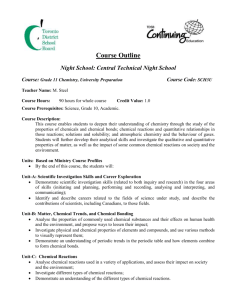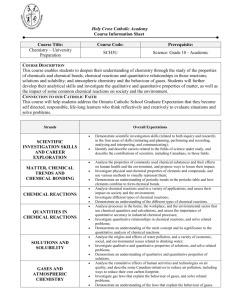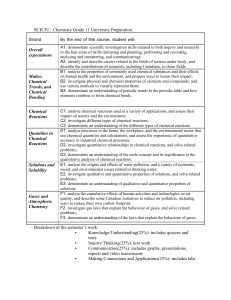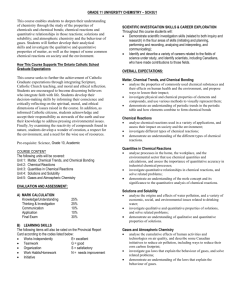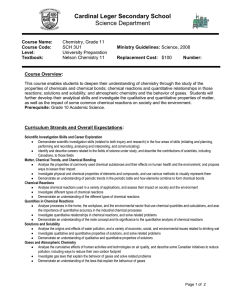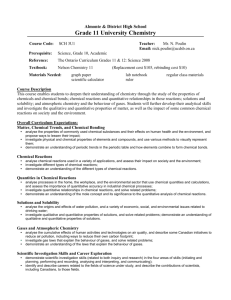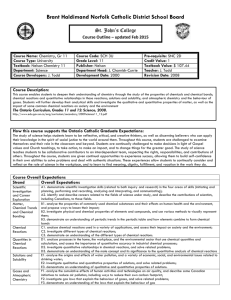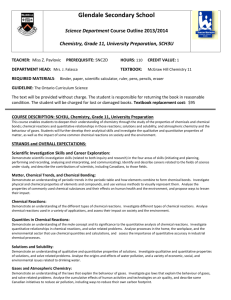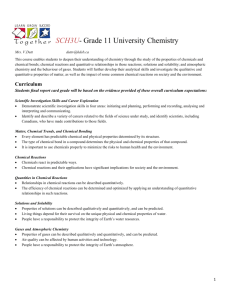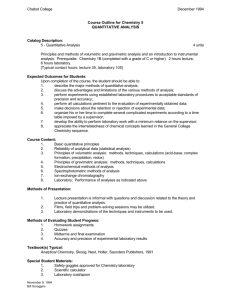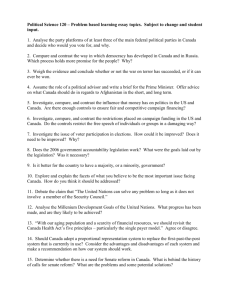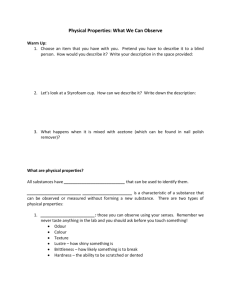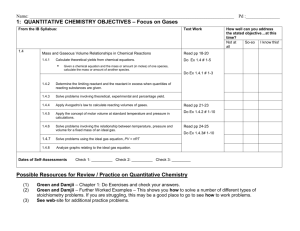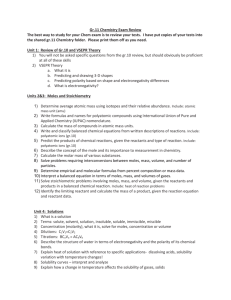SCH3U1 - Victoria Park Collegiate Institute
advertisement
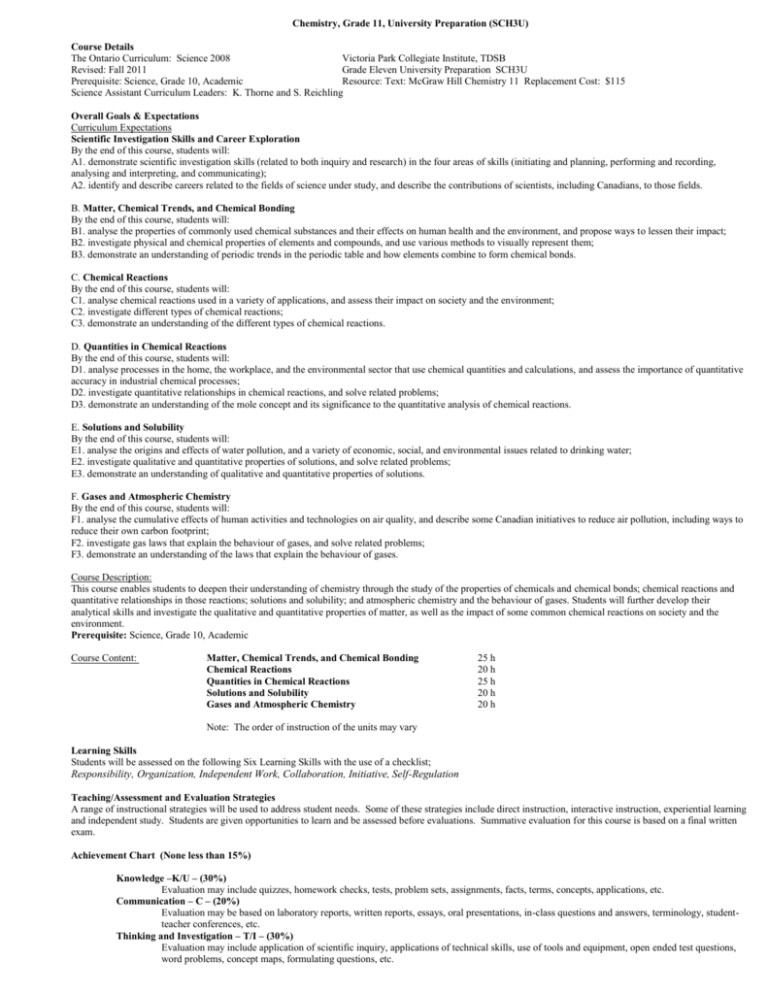
Chemistry, Grade 11, University Preparation (SCH3U) Course Details The Ontario Curriculum: Science 2008 Victoria Park Collegiate Institute, TDSB Revised: Fall 2011 Grade Eleven University Preparation SCH3U Prerequisite: Science, Grade 10, Academic Resource: Text: McGraw Hill Chemistry 11 Replacement Cost: $115 Science Assistant Curriculum Leaders: K. Thorne and S. Reichling Overall Goals & Expectations Curriculum Expectations Scientific Investigation Skills and Career Exploration By the end of this course, students will: A1. demonstrate scientific investigation skills (related to both inquiry and research) in the four areas of skills (initiating and planning, performing and recording, analysing and interpreting, and communicating); A2. identify and describe careers related to the fields of science under study, and describe the contributions of scientists, including Canadians, to those fields. B. Matter, Chemical Trends, and Chemical Bonding By the end of this course, students will: B1. analyse the properties of commonly used chemical substances and their effects on human health and the environment, and propose ways to lessen their impact; B2. investigate physical and chemical properties of elements and compounds, and use various methods to visually represent them; B3. demonstrate an understanding of periodic trends in the periodic table and how elements combine to form chemical bonds. C. Chemical Reactions By the end of this course, students will: C1. analyse chemical reactions used in a variety of applications, and assess their impact on society and the environment; C2. investigate different types of chemical reactions; C3. demonstrate an understanding of the different types of chemical reactions. D. Quantities in Chemical Reactions By the end of this course, students will: D1. analyse processes in the home, the workplace, and the environmental sector that use chemical quantities and calculations, and assess the importance of quantitative accuracy in industrial chemical processes; D2. investigate quantitative relationships in chemical reactions, and solve related problems; D3. demonstrate an understanding of the mole concept and its significance to the quantitative analysis of chemical reactions. E. Solutions and Solubility By the end of this course, students will: E1. analyse the origins and effects of water pollution, and a variety of economic, social, and environmental issues related to drinking water; E2. investigate qualitative and quantitative properties of solutions, and solve related problems; E3. demonstrate an understanding of qualitative and quantitative properties of solutions. F. Gases and Atmospheric Chemistry By the end of this course, students will: F1. analyse the cumulative effects of human activities and technologies on air quality, and describe some Canadian initiatives to reduce air pollution, including ways to reduce their own carbon footprint; F2. investigate gas laws that explain the behaviour of gases, and solve related problems; F3. demonstrate an understanding of the laws that explain the behaviour of gases. Course Description: This course enables students to deepen their understanding of chemistry through the study of the properties of chemicals and chemical bonds; chemical reactions and quantitative relationships in those reactions; solutions and solubility; and atmospheric chemistry and the behaviour of gases. Students will further develop their analytical skills and investigate the qualitative and quantitative properties of matter, as well as the impact of some common chemical reactions on society and the environment. Prerequisite: Science, Grade 10, Academic Course Content: Matter, Chemical Trends, and Chemical Bonding Chemical Reactions Quantities in Chemical Reactions Solutions and Solubility Gases and Atmospheric Chemistry 25 h 20 h 25 h 20 h 20 h Note: The order of instruction of the units may vary Learning Skills Students will be assessed on the following Six Learning Skills with the use of a checklist; Responsibility, Organization, Independent Work, Collaboration, Initiative, Self-Regulation Teaching/Assessment and Evaluation Strategies A range of instructional strategies will be used to address student needs. Some of these strategies include direct instruction, interactive instruction, experiential learning and independent study. Students are given opportunities to learn and be assessed before evaluations. Summative evaluation for this course is based on a final written exam. Achievement Chart (None less than 15%) Knowledge –K/U – (30%) Evaluation may include quizzes, homework checks, tests, problem sets, assignments, facts, terms, concepts, applications, etc. Communication – C – (20%) Evaluation may be based on laboratory reports, written reports, essays, oral presentations, in-class questions and answers, terminology, studentteacher conferences, etc. Thinking and Investigation – T/I – (30%) Evaluation may include application of scientific inquiry, applications of technical skills, use of tools and equipment, open ended test questions, word problems, concept maps, formulating questions, etc. Application – A – (20%) Evaluation may include research papers, projects, debates, interviews, analyzing issues, assessing impacts and proposing courses of action, understanding connections among Science, Technology, Society and the Environment, etc. 70% Grade on Course Work** Matter, Chemical Trends, and Chemical Bonding Task Periodic Properties Assignment Nomenclature Quiz Bonding Investigation Unit Test K/U X X X Achievement Chart Focus T/I C X X X X X A X Chemical Reactions Task Chemical Reactions Quiz Activity Series Lab Formal Lab Report Chemical Reactions Assignment-STSE Unit Test K/U X X X Achievement Chart Focus T/I C X X X A X X X X X X Quantities in Chemical Reactions Task % Composition Lab Mole Quiz Stoichiometry Assignment Stoichiometry Lab Unit Test K/U X X X Achievement Chart Focus T/I C X X X X X X X A X X X Solutions and Solubility Task Solutions Quiz Acid-Base Titration Lab Water Assignment Unknown Ion Lab Unit Test K/U X X X Achievement Chart Focus T/I C X X X X X X X X A X X X X Gases and Atmospheric Chemistry Task Gas Law Lab Gas Stoichiometry Quiz Gas Assignment- STSE * Note: The above evaluations are subject to minor changes. K/U X X Achievement Chart Focus T/I C X X X A X 30% Grade Based on Course-Culminating Activities All students will a final exam at the end of the course. The Research Process: For every research-based assignment, students will be expected to use the TDSB student research guide, Research @ Your Library with the 4 stage model of the research process incorporated into these assignments either in part or in whole. Students will receive instruction and be assessed / evaluated on various aspects of the research process by either their teacher or one of the teacher-librarians. These lessons may include, but are not limited to the development of research questions, note-taking, adherence to a specific documentation style, facility with a variety of resources, etc. Accommodations Accommodations refer to the teaching strategies, supports, and/or services that are required in order for a student to access the curriculum and demonstrate learning. Students who have an IEP are entitled to the accommodations specified in their plans. Term Grades for Provincial Reports throughout the Year The grade for each term/reporting period is based on the evaluations that have been conducted to that point in the course, and will be preliminary and tentative. They will be based on the most consistent level of achievement to that time, but some of the overall expectations, strands, end units, will not have been addressed. The students’ grades may change when all work has been evaluated at the end of the course. Midterm reports will be sent home with the students approximately half way through the semester. Communication First of all … KNOW that we want you to succeed. The science office is in room 221. You are encouraged to make an appointment with your teacher if you would like extra help, or if you wish to see/discuss your marks. Do not hesitate to ask for help. Parents/guardians may contact the teacher at any time with comments and/or concerns at 416 – 395 – 3310 ext. 20095. Parents/guardians may also schedule an interview during Parent/Teacher interview time. The teacher will contact parents/guardians as necessary.
